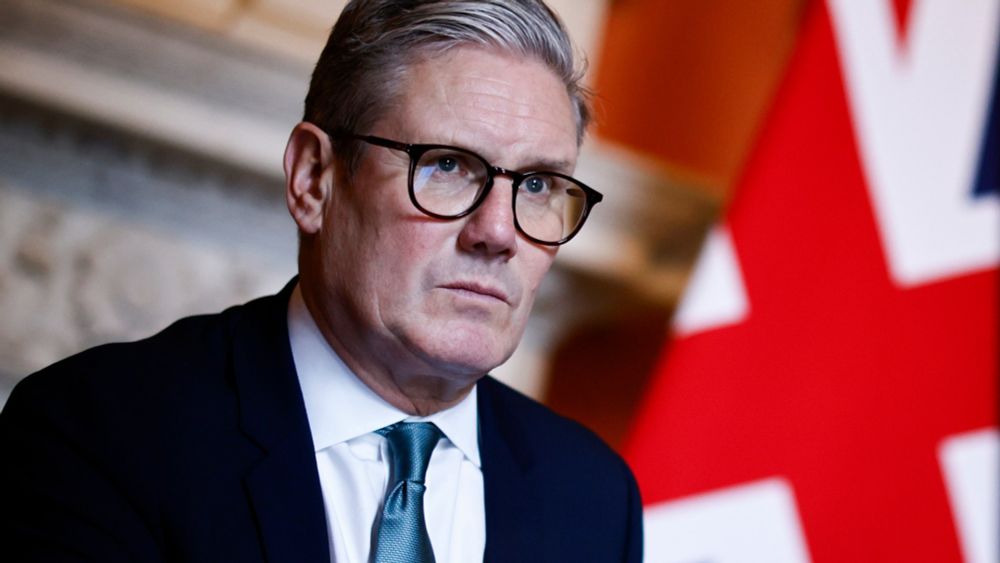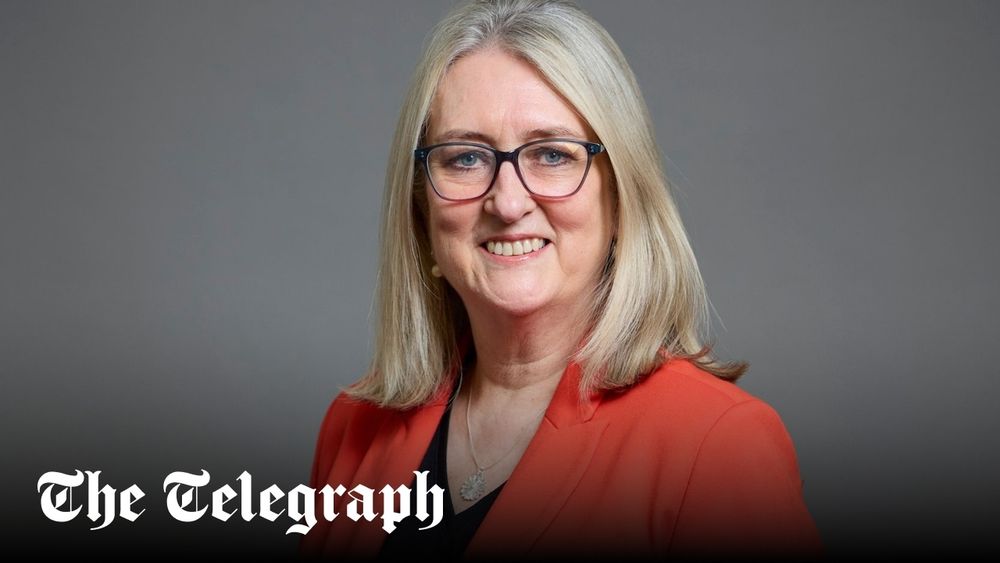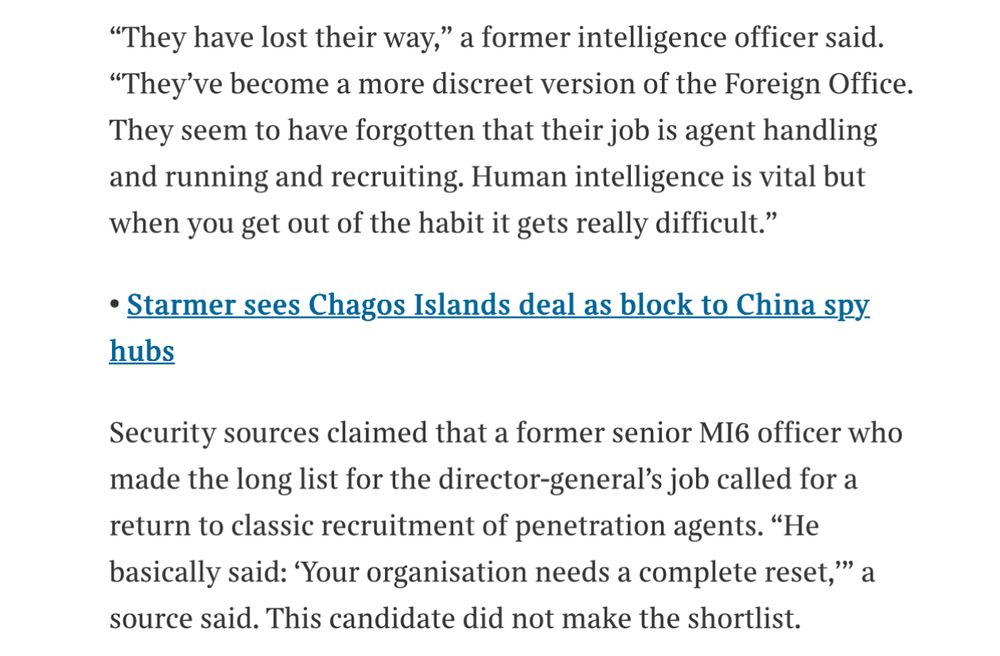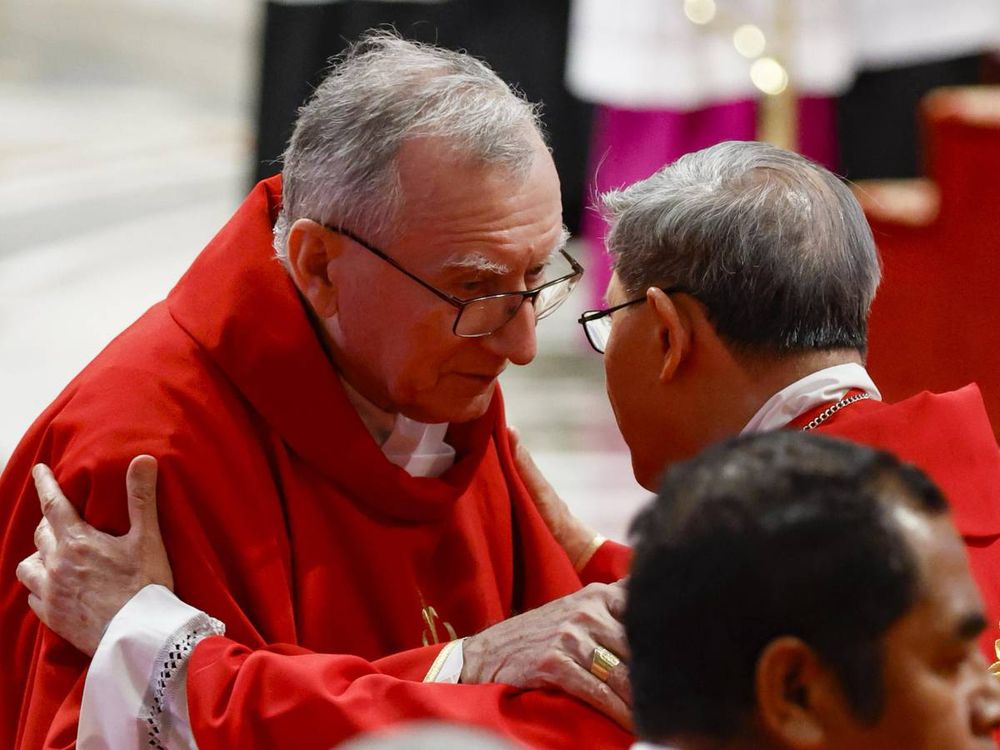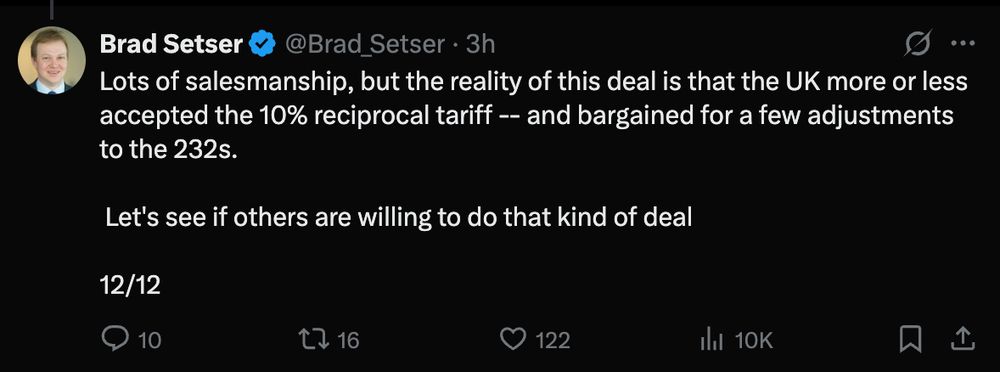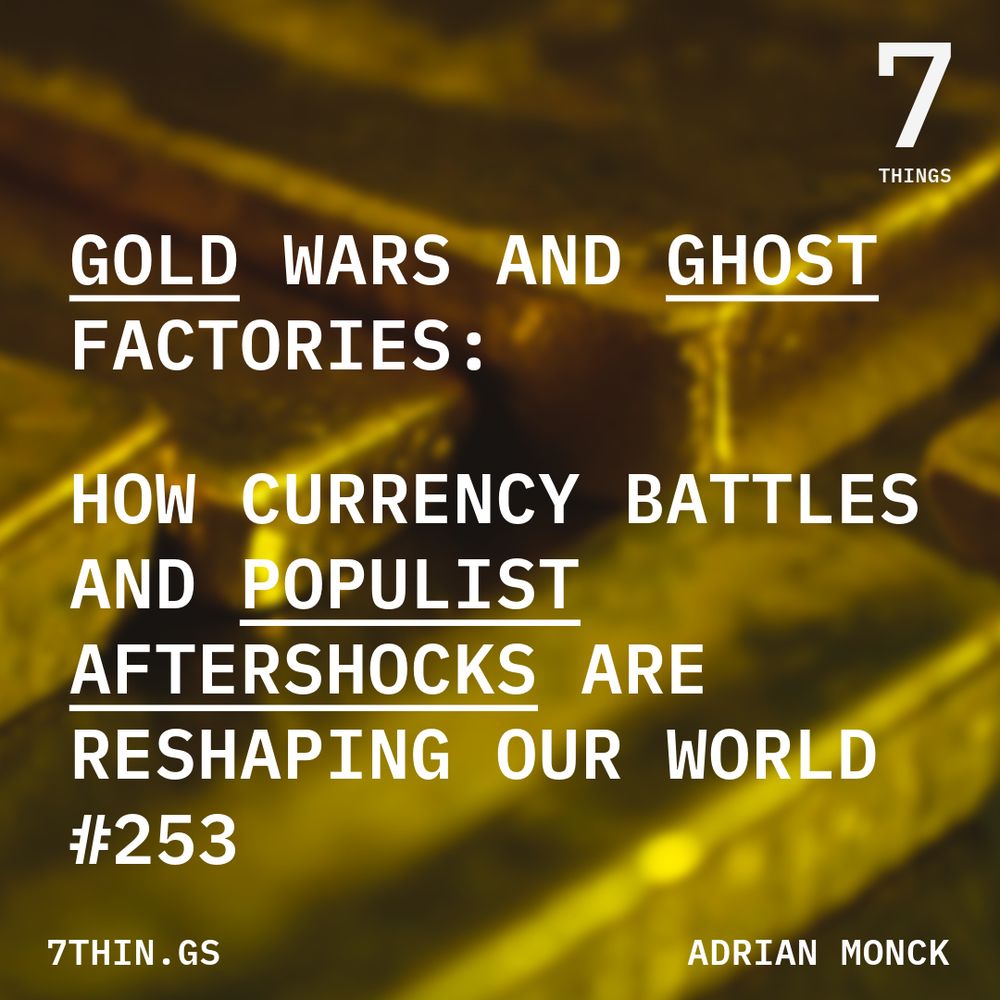Adrian Monck
Geopol. Global issues. I write “7 things.”
7thin.gs
- Capitulation Day has a ring to it.
- As the US and China step back from a needless trade war, it is worth noting that (a) US tariffs on China will remain high (30%) and will hurt mainly US consumers; and (b) Trump has obtained absolutely nothing from China for all the chaos he generated. Zilch. www.nytimes.com/2025/05/12/b...
- Pains me to say it, but Labour is Biden-ing its way forward, without any of the US’ advantages.
- PM explicit about the Reform-facing strategy to Sun on Sunday: “Certainly we were planning on the basis we were likely to be facing Reform at the next election in any event. So that coincides with our thinking. I think the Tory party is a busted flush” www.thesun.co.uk/news/3489342...
- You have to wade through a lot of goofing to get to this: “Backers are asked to believe that OpenAI is the most responsible guardian of The Dangerous Majick, while also understanding that the urgency of AI’s arms race frees it from all obligation to act responsibly.” www.ft.com/content/b180...
- Salaries in UK universities are wildly uncompetitive. When I was running City’s Journalism School it was kept afloat by the kindness of adjuncts - working journalists, hardly wealthy themselves - who took peppercorn fees that would hardly pay their tube fares.
- I have never seen people run away from the scene of a public policy disaster quicker than this one. Astonishing and disgraceful. www.telegraph.co.uk/news/2025/05...
- The US actually showed up, which has to be the first encouraging result.
- [Not loaded yet]
- [Not loaded yet]
- My son’s just finishing a PolSci Econ degree and I asked him if they’d discussed the Plaza Accords… They had not. And Susan Strange taught there!
- How people who don’t make top job shortlist settle scores, MI6 edition 👇
- [Not loaded yet]
- It might well be true. But this kind of sour grapesing isn’t the way to make the point…
- Achievement unlocked. Last leg of 810m climb 🚴
- [Not loaded yet]
- He escaped fairly early.
- The bizarre legacy of the British empire in choosing a Roman Catholic pope www.ilgiornale.it/news/politic...
- He was an American Pope. Raised on promises.
- A US assessment of the US-UK trade deal
- 💥 New look for old newsletter 👇
- 1/ The “Special Relationship”: How American-British Elite Alignment Shaped Post-WW2 Britain, And The Silence At The Heart Of British Politics That Still Affects Ordinary Citizens 🇺🇸🇬🇧
-
View full thread16/ TL;DR: Whilst the British Empire’s demise was necessary and just, the particular form it took – managed by Atlanticist elites to align with American interests – has profoundly shaped ordinary Britons’ lives, often without their democratic input or economic benefit.
- 17/ For more, share, follow or subscribe 7thin.gs
- 14/ American influence operated not through imperial institutions, but by use of financial leverage and elite networks to exert influence and control – making it harder for ordinary people to identify, yet just as consequential for their economic lives.
- 15/ Today’s Britain reflects this complicated legacy: no longer an imperial power, but shaped by elite Atlanticist decisions that often bypassed democratic input from ordinary citizens whilst transforming their economic and social landscape. The rise of Reform UK is – strangely – one of the results.
- 13/ For ordinary Britons, this elite Atlanticism has meant a particular kind of globalisation: one that embraced American-style finance capitalism while dismantling the industrial policies that once supported manufacturing communities across Britain.
- 13/ The Brexit debate partially reflected this tension – with “sovereignty” concerns often masking deeper anxieties about decades of elite decisions that prioritised financial services and American alignment over industrial communities and European integration.
- 11/ The physical American presence in Britain – military bases like RAF Lakenheath with nearly 5,000 US personnel – created two realities: some economic benefits for local communities but also constant reminders of Britain’s subordinate security status.
- 12/ British cultural institutions increasingly oriented toward American approval – with the BBC, universities, and think tanks developing transatlantic networks that prioritised US perspectives over continental European or independent British approaches.
- 9/ This elite consensus often ignored public opinion. While 67% of Britons opposed the 2003 Iraq War, Tony Blair committed troops based primarily on maintaining the “special relationship” with America – prioritising elite Atlanticism over democratic accountability.
- 10/ Media ownership concentrated in Atlanticist hands shaped British public discourse, consistently presenting American interests as aligned with British ones, despite growing inequality and deindustrialisation affecting working-class communities. Elite reporting focused on Washington’s politics.
- 7/ The economic impact on ordinary Britons? Petrol rationing was imposed from December 1956 to May 1957, with ration books and coupons becoming a daily reality for British motorists – a direct consequence of American financial pressure forcing British withdrawal from Suez.
- 8/ But in British politics, aversion to subsequent humiliation made “Atlanticism” the dominant elite consensus – with both Conservative and Labour leaders embracing American strategic leadership as the price of continued relevance on the world stage.
- 5/ When textile workers in Lancashire or shipbuilders in Glasgow lost jobs as American goods flooded markets previously protected by imperial trade rules, they weren’t mourning empire – they were experiencing the very direct economic impact of declining British leverage.
- 6/ The 1956 Suez Crisis highlighted this new reality: when Britain attempted independent action, American financial pressure forced it into a humiliating retreat. An “economic panic’ meant tens of millions of pounds lost from the country’s reserves. Britain faced having to devalue its currency.
- 3/ After WW2, British and American elites crafted a narrative of “special relationship” that masked a fundamental power transition. While the Empire’s fall was both inevitable and necessary, the terms were dictated from Washington, not by postcolonial movements.
- 4/ Financial arrangements like the 1946 Anglo-American loan ($3.75B at 2% interest) came with strings attached – dismantling Imperial Preference trade systems that had employed thousands of British workers in manufacturing and shipping.
- 2/ While few would mourn the British Empire’s demise, the story of how America replaced Britain as global hegemon reveals much about how ordinary Britons have experienced the post-war world.
- [Not loaded yet]
-
View full thread16/17 The October 2025 JCPOA expiration creates a ticking clock. With no diplomatic reset, we’re approaching a decision point where Israel and the US may feel compelled to act militarily to prevent Iranian nuclear advancement.
- 17/17 This moment echoes historical patterns where diplomatic breakdowns preceded military action. The next two weeks – particularly Trump’s Gulf visit – will determine whether we’re witnessing diplomatic posturing or the prelude to something more serious.
- 14/17 The most likely outcome still remains a strategic stalemate with periodic escalations. A military confrontation is becoming more likely, with hopes for diplomatic resolution fading.
- 15/17 Trump’s upcoming Middle East tour will be decisive. Watch for three key indicators: • New diplomatic format proposed after Gulf meetings • Additional US military deployments • Netanyahu’s rhetoric on Iran before/after the Trump visit
- 12/17 Iran’s position remains calculating but constrained. They maintain ~275kg of uranium enriched to 60% – a short technical step from weapons-grade. The regime is betting on strategic patience while facing severe economic pressure.
- 13/17 Turkey’s airspace denial demonstrates Israel’s growing regional isolation. Even as Azerbaijan was willing to host Netanyahu, Ankara’s refusal to play along signals deeper regional realignments.
- 10/17 Most troubling: this confrontation is occurring as diplomatic off-ramps are disappearing. Azerbaijan was mediating Israel-Turkey talks. Oman was facilitating US-Iran dialogue. Both channels are now compromised.
- 11/17 The collapse of these back-channels increases the risk of miscalculation. When leaders can’t talk, they often resort to military signalling that can spiral out of control.
- 8/17 What’s behind this hardening position? Trump is balancing competing demands: demonstrating strength with Iran while avoiding a wider Middle East war. Defence contractors are certainly pleased – a $100B Saudi arms deal is reportedly in the works.
- 9/17 For Netanyahu, the stakes are existential – nationally and personally. Faced with growing domestic opposition (polls show ~70% of Israelis support ending the Gaza war to free hostages), he’s pivoted to framing Iran as the primary threat.
- 6/17 The US position on Iran has hardened dramatically. Early talks seemed open to allowing Iran limited uranium enrichment (3.67%). Now Sec. State Rubio and Trump are calling for “full dismantling” of Iran’s nuclear programme.
- 7/17 This shift effectively demands Iran accept terms similar to Libya’s 2003 nuclear surrender – a model Iranian officials have rejected, calling it “non-negotiable.”
- 4/17 Meanwhile, Israel has called up “tens of thousands” of reservists in what appears to be preparation for expanded military operations. The IDF says this mobilisation will begin this week.
- 5/17 These developments aren’t coincidental. They signal a potential strategic shift from diplomatic engagement to military preparation, particularly ahead of President Trump’s visit to Saudi Arabia, Qatar and UAE (May 13-16).
- 2/17 What’s happening? US-Iran nuclear talks scheduled for May 4 in Rome were abruptly cancelled. The official reason: “technical” and “logistical” concerns. The real story: rapidly hardening positions on both sides.
- 3/17 Simultaneously, Netanyahu was forced to cancel his trip to Azerbaijan (May 7-11) after Turkey denied his plane airspace access. This visit would have been his first to a Muslim nation since the Gaza war began.



